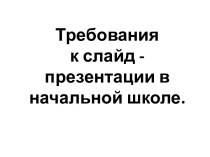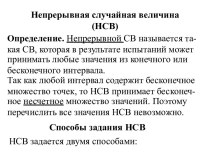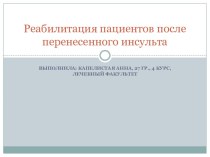- Главная
- Разное
- Бизнес и предпринимательство
- Образование
- Развлечения
- Государство
- Спорт
- Графика
- Культурология
- Еда и кулинария
- Лингвистика
- Религиоведение
- Черчение
- Физкультура
- ИЗО
- Психология
- Социология
- Английский язык
- Астрономия
- Алгебра
- Биология
- География
- Геометрия
- Детские презентации
- Информатика
- История
- Литература
- Маркетинг
- Математика
- Медицина
- Менеджмент
- Музыка
- МХК
- Немецкий язык
- ОБЖ
- Обществознание
- Окружающий мир
- Педагогика
- Русский язык
- Технология
- Физика
- Философия
- Химия
- Шаблоны, картинки для презентаций
- Экология
- Экономика
- Юриспруденция
Что такое findslide.org?
FindSlide.org - это сайт презентаций, докладов, шаблонов в формате PowerPoint.
Обратная связь
Email: Нажмите что бы посмотреть
Презентация на тему Business etiquette
Содержание
- 2. FranceThe French adhere to a strong and
- 3. Business meetingMeetings come in a variety of
- 4. Appointments are necessary and should be made
- 5. Punctuality In France it is vital to
- 6. France Behavior French business behaviour
- 7. Do not sit with legs spread apart.
- 8. Wait to be told where to sit.Maintain
- 9. Business communicationIf you do not speak French,
- 10. Mutual trust and respect is required to
- 11. Names and titlesUse last names and appropriate
- 12. Corporate Culture Professionalism is highly valued
- 13. Business appearanceThe French are very conscientious of
- 16. For business, men should wear conservative suits
- 17. Business dinner Do not ask
- 19. LunchtimeEating etiquette and table manners are also
- 20. When Invited to Dinner Business gifts
- 21. French gesturesThe French are just as famous
- 22. BUSINESS EXPRESSIONS
- 23. Expect probing questions and interruptions It
- 24. Have one side of your business
- 25. French business cards are often a bit larger than in many other countries.
- 26. Helpful Hints Lower your voice a
- 27. Скачать презентацию
- 28. Похожие презентации
FranceThe French adhere to a strong and homogeneous set of values. They cherish their culture, history, language and cuisine, which is considered an art. The French have been and are today world leaders in fashion, food,






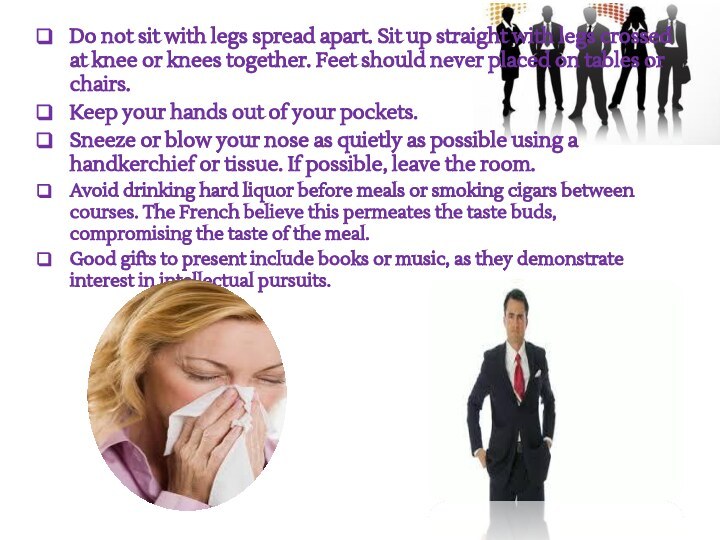

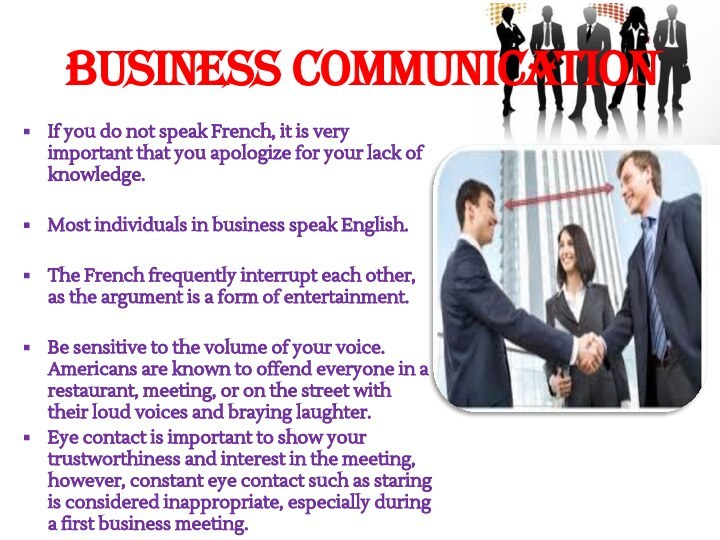






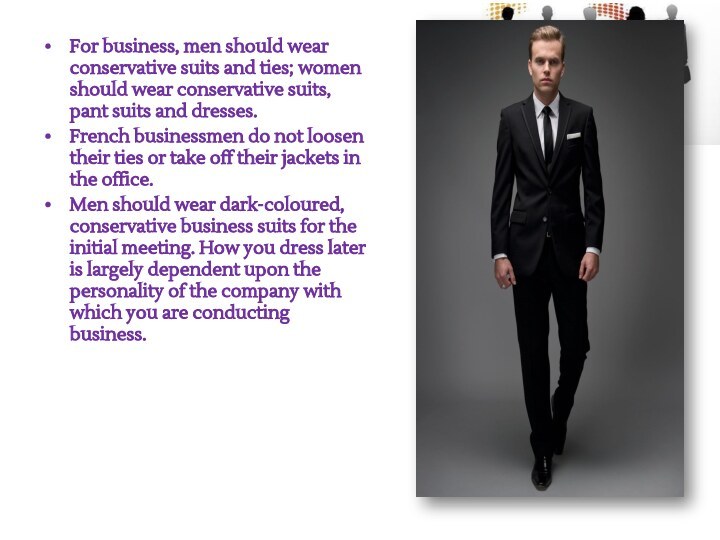




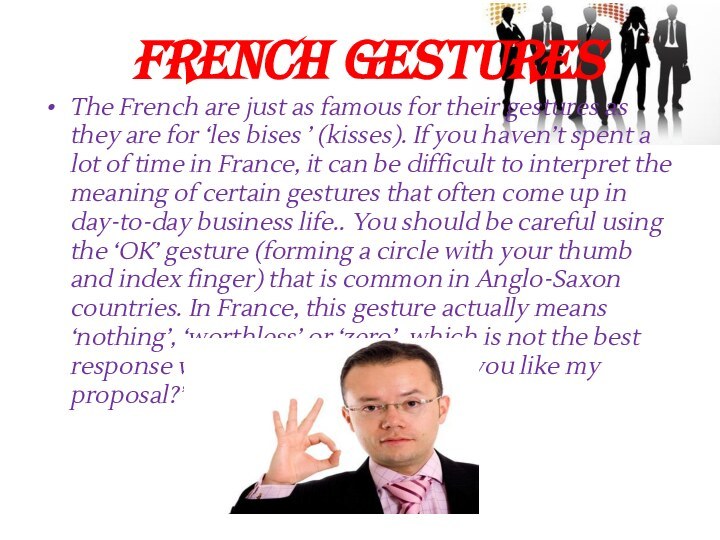

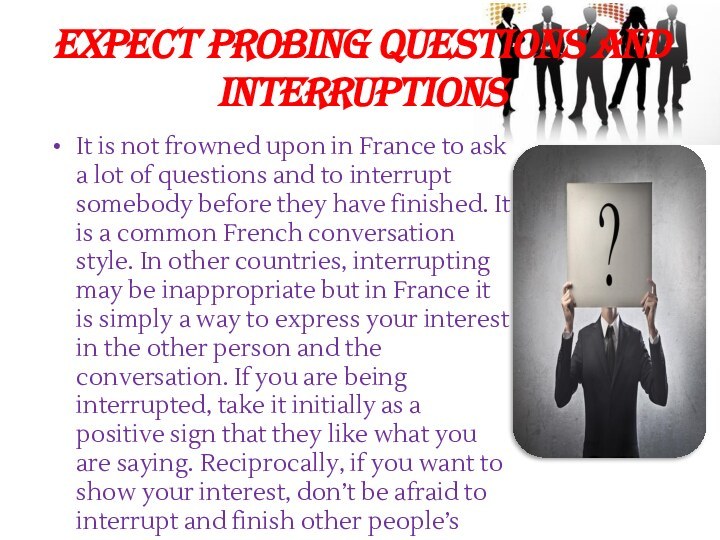




Слайд 3
Business meeting
Meetings come in a variety of forms,
and are more important than ever in business today.
There are the everyday office meetings, board meetings, and seminars. Meetings can now be face-to-face, by teleconference, video-conference, or online via the Internet. Meetings are a common form of corporate life in France.
Слайд 4
Appointments are necessary and should be made at
least 2 weeks in advance.
Appointments may be made in
writing or by telephone and, depending upon the level of the person you are meeting, are often handled by the secretary.Do not try to schedule meetings during July or August, as this is a common vacation period.
If you expect to be delayed, telephone immediately and offer an explanation.
Meetings are to discuss issues, not to make decisions.
Avoid exaggerated claims, as the French do not appreciate hyperbole.
Слайд 5
Punctuality
In France it is vital to ensure
that you make appointments for both business and social
occasions. It is not acceptable in France to ‘drop in’ on someone unannounced and such conduct will be taken as an act of rudeness, whatever the occasion. While you should strive to be punctual, you will not be considered to be late, should you arrive ten minutes after the scheduled time.
Слайд 6
France Behavior
French business behaviour emphasizes courtesy and
a degree of formality.
Punctuality is treated very casually
in France.The French handshake is brief, and is accompanied by a short span of eye contact.
Always shake hands when meeting someone, as well as when leaving. French handshakes are not as firm as in the United States.
The French have a great respect for privacy. Knock and wait before entering into a room. Additionally, do not "drop in" unannounced. Always give notice before your arrival.
Business can be conducted during any meal, but lunch is best.
Слайд 7 Do not sit with legs spread apart. Sit
up straight with legs crossed at knee or knees
together. Feet should never placed on tables or chairs.Keep your hands out of your pockets.
Sneeze or blow your nose as quietly as possible using a handkerchief or tissue. If possible, leave the room.
Avoid drinking hard liquor before meals or smoking cigars between courses. The French believe this permeates the taste buds, compromising the taste of the meal.
Good gifts to present include books or music, as they demonstrate interest in intellectual pursuits.
Слайд 8
Wait to be told where to sit.
Maintain direct
eye contact while speaking.
It is considered polite to say,
“Bonjour” when entering a place of business. Similarly, when exiting, politeness requires an, “Au revoir.” This practice is also followed when entering and exiting elevators.
Слайд 9
Business communication
If you do not speak French, it
is very important that you apologize for your lack
of knowledge.Most individuals in business speak English.
The French frequently interrupt each other, as the argument is a form of entertainment.
Be sensitive to the volume of your voice. Americans are known to offend everyone in a restaurant, meeting, or on the street with their loud voices and braying laughter.
Eye contact is important to show your trustworthiness and interest in the meeting, however, constant eye contact such as staring is considered inappropriate, especially during a first business meeting.
Слайд 10 Mutual trust and respect is required to get
things done.
Trust is earned through proper behaviour.
Creating a wide
network of close personal business alliances is very important.If you do not speak French, an apology for not knowing their language may aid in developing a relationship.
It is always a good idea to learn a few key phrases, since it demonstrates an interest in a long-term relationship.
In business, the French often appear extremely direct because they are not afraid of asking probing questions.
Слайд 11
Names and titles
Use last names and appropriate titles
until specifically invited by your French host or colleagues
to use their first names. First names are used only for close friends and family.Colleagues on the same level generally use first names in private but always last names in public.
Address people as Monsieur, Madame or Mademoiselle without adding the surname.
Madame is used for all adult women, married or single, over 18 years of age (except for waitresses, which are addressed as Mademoiselle.)
Слайд 12
Corporate Culture
Professionalism is highly valued in business and
is the key to acceptance of outsiders.
Be on time.
The French appreciate punctuality.Give business cards to the receptionist or secretary upon arrival to an office and to each person you meet subsequently. Print cards in English or French. Include academic degree and/or title.
Don't discuss personal life with business people. Personal lives are kept separate from business relationships.
The French get down to business quickly, but make decisions slowly after much deliberation.
Presentations should be well prepared, comprehensive, clear, well-written, informative and presented in a formal, rational, professional manner -- appealing always to the intellect.
The French dislike the hard sell approach.
Avoid planning business meetings during August or two weeks before and after Christmas and Easter period
Do not call a French businessperson at home unless it is an emergency.
Слайд 13
Business appearance
The French are very conscientious of their
appearance.
Dress is conservative and understated and stylish. Casual attire
is inappropriate in cities. Be clean and well-dressed at all times.Dress conservative and invest in well-tailored clothing.
Patterned fabrics and dark colors are most acceptable, but avoid bright colors.
Women should also dress conservatively. Avoiding bright or gaudy colors is recommended.
Women should also avoid any glitzy or overpowering objects, such as flashy jewelry.
Women should wear either business suits or elegant dresses in soft colours.
The French like the finer things in life, so wear good quality accessories.
Слайд 16 For business, men should wear conservative suits and
ties; women should wear conservative suits, pant suits and
dresses.French businessmen do not loosen their ties or take off their jackets in the office.
Men should wear dark-coloured, conservative business suits for the initial meeting. How you dress later is largely dependent upon the personality of the company with which you are conducting business.
Слайд 17
Business dinner
Do not ask for a martini
or scotch before dinner -- they are viewed as
palate numbing.Business entertainment is done mostly in restaurants.
The French do not like to discuss business during dinner. Dinner is more of a social occasion and a time to enjoy good food, wine and discussion.
Spouses are not included in business lunches, but may be included in business dinners.
A female guest of honor is seated to the right of the host. A male guest of honor is seated to the left of the hostess.
Keep your hands on the table at all times during a meal — not in your lap. However, take care to keep your elbows off the table.
Never eat fruit whole. Fruit should be peeled and sliced before eating.
When finished eating, place knife and fork side by side on the plate at the 5:25 position.
Cross your knife and fork across your plate to signify that you would like more food.
Leaving food on your plate is impolite.
Do not ask for a tour of your host's home, it would be considered impolite.
Send a thank-you note or telephone the next day to thank hostess.
Слайд 19
Lunchtime
Eating etiquette and table manners are also highly
important – “bon appétit” is a good phrase to
use before starting to eat since this will illustrate your respect for the French culture. If you dining in a party, it is considered polite to leave until the last person has finished their final course.Generally, lunchtime is from 12:30 or 13:00 and can last until 15:00. Dinners are usually from 20:30 to 23:00. Some restaurants close between lunch and dinner service so you have to phone in advance and confirm their opening times and reserve a table.
Слайд 20
When Invited to Dinner
Business gifts are usually not
exchanged at the first meeting.
Give a good quality gift
or none at allIf you are invited to a French home, consider it a rare honour. Bring flowers, quality chocolates or liqueur for the host, and present your gift before the entertaining proceeds.
Flowers should be sent in advance on the day of the dinner (popular in Paris) so that the hostess has time to arrange them and is not faced with this task when she is busy with a meal, or else unwrap them before presenting them to your hostess. Otherwise, present a gift on arrival – this will probably not be unwrapped immediately (unless no other guests are present or expected).
In accordance with the old European tradition, a bouquet should have an odd number of flowers, but never seven or thirteen.
Do not take a gift of wine, since the host usually prefers to make the evening’s selection themselves – this will have been carefully thought out to complement the food. The only possible exceptions to this would be a special French dessert wine or high-quality liqueur. Other exceptions if you really want to bring a bottle of wine would be one from your own country or a bottle of Champagne.
If you have been a guest at a dinner party or similar social gathering in a home, ensure that you send a thank-you note to your hosts the next day. Preferably, your note should be handwritten and delivered by La Poste. Sending flowers or a basket of fruit is another thoughtful gesture appreciated by the French.
Слайд 21
French gestures
The French are just as famous for
their gestures as they are for ‘les bises ’
(kisses). If you haven’t spent a lot of time in France, it can be difficult to interpret the meaning of certain gestures that often come up in day-to-day business life.. You should be careful using the ‘OK’ gesture (forming a circle with your thumb and index finger) that is common in Anglo-Saxon countries. In France, this gesture actually means ‘nothing’, ‘worthless’ or ‘zero’, which is not the best response when somebody asks ‘Did you like my proposal?’
Слайд 22
BUSINESS EXPRESSIONS
Just as
the English language has slang expressions particular to business,
(often clichés such as "window of opportunity", "run it up the flagpole," etc.), French has culinary expressions and aphorisms which are very confusing, and often amusing, to the learner. Some of these are listed below and they give an idea of the important role played by food in doing business in France.Les grosses légumes / The big vegetables =senior management
Le gratin / The topping =senior management
Un citron pressé / A squeezed lemon =burnt-out manager
Des choux gras / fat cabbages =big profits
Слайд 23
Expect probing questions and interruptions
It is not frowned
upon in France to ask a lot of questions
and to interrupt somebody before they have finished. It is a common French conversation style. In other countries, interrupting may be inappropriate but in France it is simply a way to express your interest in the other person and the conversation. If you are being interrupted, take it initially as a positive sign that they like what you are saying. Reciprocally, if you want to show your interest, don’t be afraid to interrupt and finish other people’s sentences, too.Слайд 24 Have one side of your business card in
French.
It always shows respect and courtesy for the other
person when you have one side of your business card printed in French and the other in your native language. In France, people commonly write their family name in capital letters so that it stands out. You should do the same. If you are interviewing in France, you will be remembered if you present to the interviewer your personal business card. If you attend networking events, you will always look organised if you use a professional business card case. Just make sure there is enough room for both your cards and for the cards that you will receive.
Слайд 26
Helpful Hints
Lower your voice a little and behave
gracefully and you will enjoy a warm response from
the French.The French value their privacy. Don’t ask personal questions related to occupation, salary, age, family or children unless you have a well-established friendship.
Try to demonstrate some knowledge of history, politics and French culture.
Compliments may be appreciated, but usually are received by denial instead of "thank you."
Do not chew gum in public.
The French do not tell or like to hear jokes. They prefer intelligent and satirical wit. Funny stories of real life situations are appreciated.


